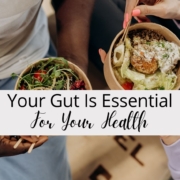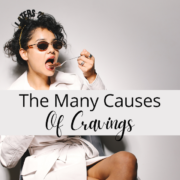Is Depression A Challenge You Face?
A mental health crisis is underway in the U.S. Depression is among the most common mental health issue with 21 million adults experiencing one or more major depressive episodes. A growing number of children and teens are also experiencing depression. Is depression a challenge you face?
Antidepressant medications remain a first-line treatment for depression, even though 2/3 of depressed patients don’t respond well to them. Many doctors are not recognizing the role that the gut plays in mood. Both the foods you eat and the balance of bacteria that reside in your gut affect your mood.
The primary information highway between your gut and your brain is your vegus nerve, which also connects with your major organs. It’s a two-way path. Your gut communicates with your brain via the endocrine system and by producing neurotransmitters such as serotonin, dopamine and GABA.
A review of many studies has confirmed an association for children and teens between an unhealthy diet and poor mental health. There was also a clear association between a good-quality diet and better mental health. The same effects are experienced by adults.
Eating Healthy Reduces Depression
If you have followed me for any time, you’ve heard that junk food can mess with your health and your mind. Researchers at Macquarie University, Australia, studied 76 students ages 17-35 with moderate to high depression symptoms.
Half of the participants continued to eat as they had prior to the study. The other half shifted from processed food, sugar and soft drinks to eating more vegetables, fruits, nuts, and healthy fats. After only 3 weeks of healthier eating, these students had significant improvements in mood and their depression score was normal. That’s the power of food!
Those who consume a standard Western diet, which is pro-inflammatory, have the highest rates of depression. It is common to be depleted in Vitamins D, B12, and Folate, which are key for the body to produce mood-regulating neurotransmitters.
Magnesium is another common deficiency that can contribute to depression. Individuals with depression are known to have lower magnesium levels in the blood, brain, and cerebral spinal fluid. Oral supplementation with Magnesium Chloride or L-Threonate has been found to be as effective as an antidepressant for improving mood.
Probiotics Benefit People With Depression
Your gut microbiome impacts your brain function via the vagus nerve. People with depression often have altered gut microbiome composition. Improving the balance of the microbiome has been shown to improve symptoms. A 4-week study compared the addition of probiotics versus placebo to antidepressants and found those in the probiotic group had significant improvements.
Though there is no clear evidence of which specific bacteria strains improve symptoms. Yet, Lactobacillus strains produce the GABA neurotransmitter which induces calm and reduces depression-related behavior. Another beneficial approach is to use spore-based probiotics which support rebalancing the gut microbiome, and these can be taken with food.
If you experience symptoms of depression, I highly recommend that you evaluate the food you are eating and the condition of your gut microbiome. It’s easy to determine whether your meals are comprised of more whole foods or processed foods, and shift to filling half your plate with vegetables. You can also add a probiotic supplement – I recommend a spore-based one – to shift the balance of your microbiome for neurotransmitter production.
Wellness includes a balanced mood. You have the power to affect your mood through your food and its effect on your microbiome. Boost your mood with each bite you eat.










